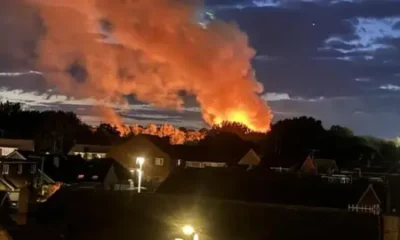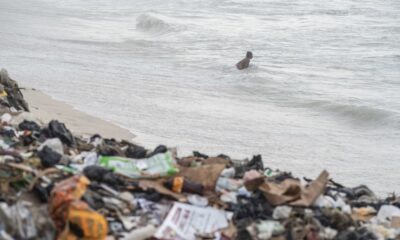Breaking News
Police used journalists’ phone data to detect leaks by staff, report says
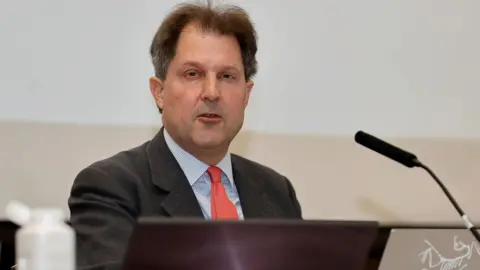
Read more on post.
Julian O’NeillBBC News NI crime and justice correspondent
Concerns have been raised over how the Police Service of Northern Ireland (PSNI) used journalists’ phone numbers to check for any leaks of information by its officers or staff.
A 200-page report also revealed there were 21 unlawful uses of covert powers to attempt to uncover reporters’ sources – double the figure previously disclosed.
Its author, lawyer Angus McCullough KC, said he found that the PSNI’s surveillance of journalists and lawyers is not “widespread or systemic”.
PSNI Chief Constable Jon Boutcher said the report “rightfully highlights that we have to improve our processes, and we will”.
Mr Boutcher said that “blanket searching of journalists” stopped in 2023, and “[would] not happen again”.
In the report, Mr McCullough was critical of “particular instances” and “some areas of practice”.
The report covered PSNI surveillance practices between 2011 and 2024.
Last year, Mr McCullough was asked to carry out an independent review by Mr Boutcher.
It followed legal action by journalists Barry McCaffrey and Trevor Birney and allegations that other journalists, and lawyers, might have had their phones monitored.
The PSNI previously admitted 10 attempts to use the communications data of journalists to try to identify their sources.
But the report found 21 instances, all pre-2015, which are “considered unlawful” and which relate to eight journalists, including Mr McCaffrey.
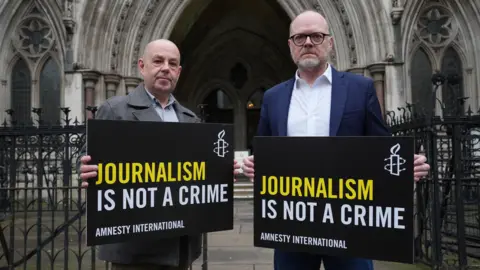 PA Media
PA MediaIn 2017, Mr Birney and Mr McCaffrey produced a documentary about the loyalist murders of six Catholic men as they watched a football match in a pub in Loughinisland in County Down in 1994.
No Stone Unturned was made by Belfast-based production company, Fine Point Films and directed by Oscar winner, Alex Gibney.
It examined how the Royal Ulster Constabulary (RUC) handled the case and made use of confidential documents from the Police Ombudsman for Northern Ireland (PONI) – a watchdog which investigates police conduct.
The PSNI treated the leak of PONI documents as theft.
A year later the two journalists were arrested.
They said their arrests were “an attack on the press” and challenged the way they were treated in court, winning substantial damages amounting to £875,000.
However, through legal disclosure material surfaced which revealed details of surveillance against them and other journalists.
Speaking on BBC Radio Ulster’s Talkback programme, Mr McCaffrey called for a public inquiry.
He said this would allow Northern Ireland Secretary Hilary Benn to “put the public confidence back in policing”.
Mr Birney welcomed the report but said his and Mr McCaffrey’s lawyers had not had a chance to “cross-examine the PSNI” and “review those documents… and test them against the law”.
Freedom of expression
Speaking at the report’s launch, Mr McCullough said there had been concerns of the effect the arrests could have on investigative journalism in Northern Ireland.
“Two journalists who had been investigating mass murder and allegations of state collusion had been arrested and subject to covert measures and surveillance of a suspected source”, the barrister said.
“The right of freedom of expression – including the freedom for journalists and civil society to examine the actions of the state – is fundamental to democracy.”
‘Lack of awareness’
The report also raised issues around the use of journalists’ phone numbers, which had been provided to the PSNI’s press office.
Between 2011 and 2023, the numbers were “washed through” police systems to detect any unauthorised contact between PSNI officers or staff and journalists.
This was referred to as pro-active “defensive operations” against leaks.
At one point, in 2011, it involved checking 65,000 calls against 383 journalists’ numbers.
The report states: “No legal advice appears to have been sought in relation to the legality or propriety of the practice.
“There seems to have been a lack of awareness until very recently that it might give rise to issues in relation to data protection and the rights of those whose data was being used unknowingly.
“This practice does not appear to have been necessary or proportionate.
“The scale and duration of defensive operations is a significant concern.”
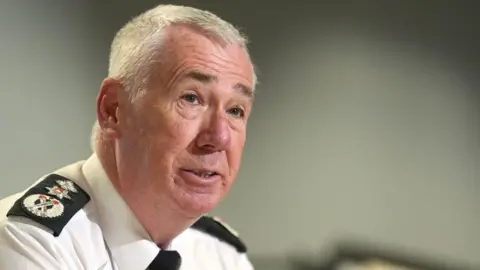 PA Media
PA MediaMr McCullough said the PSNI should consider self-reporting the matter to the UK’s data protection watchdog, the information commissioner.
He noted the practice was only formally discontinued in May of last year.
Investigative journalist Donal MacIntyre is named in the report as having been the subject of directed surveillance following posts he made on social media.
He is working on a documentary about the disappearance and death of schoolboy Noah Donohoe.
There was an unease that the X posts “created a serious risk of prejudice” to upcoming inquest proceedings.
Mr McCullough said he is concerned about the process that led to the surveillance being authorised, but added he found “no indication” that Mr MacIntyre’s private communications with Noah’s mother had been accessed.
Mr McIntyre said he was “shocked at the lackadaisical and lamentable processes that led the PSNI to authorise covert surveillance of [his] social media accounts”.
He said he was “relieved” that the review found his communications with Noah’s mother were not accessed.
However, he added that the findings exposed “profound institutional failings in the PSNI’s approach to covert surveillance” and raised “grave concerns” about the intrusion into his work and “the wider and potentially unchecked use of these powers in Northern Ireland”.
The report also found two instances of directed surveillance against an unnamed lawyer, including in a court building, without proper authorisation.
Mr McCullough did not examine any cases currently at the Investigatory Powers Tribunal, including MI5-conducted phone surveillance of journalist Vincent Kearney while he worked at the BBC.
Solicitor surveillance
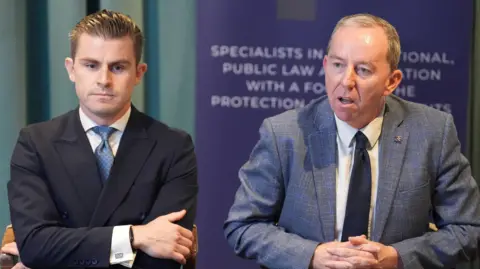 PA Media
PA MediaThe Chief Constable Jon Boutcher has issued a personal apology to two solicitors.
The apology, to Peter Corrigan and Darragh Mackin of Phoenix Law, came after a review found that the two were the subject of phone surveillance authorised on a “questionable” basis.
They said the surveillance trespassed upon legal professional privilege and linked it to appeal proceedings by two men jailed for the murder of police officer Stephen Carroll in Craigavon in 2009.
“A legal professional privilege is not some sort of technicality – it’s absolutely the foundation stone of a fair, criminal justice system in a liberal democracy and the PSNI have driven a coach and horses through that legal principle,” said Mr Corrigan.
“The police are entrusted to uphold the law and they have broken the law and acted unlawfully against us and our families. And obviously the fact that it has been identified in a report has to be commended and I would take this opportunity to also commend the chief constable for sending us both an apology for this arbitrary invasion of our privacy and our professional duties.”
‘Appropriate use of powers’
Mr Boutcher said that “properly exercised covert powers” had “an important role to play” in detecting, investigating, prosecuting and preventing crime.
“Mr McCullough makes reference to being struck by the utility of these powers in keeping the public better protected from a range of threats including organised crime, terrorism, paedophile rings and large scale drug supply,” he said.
Mr Boutcher said that “appropriate, lawful and proportionate use of these powers” keeps people safe and “builds confidence in policing”.
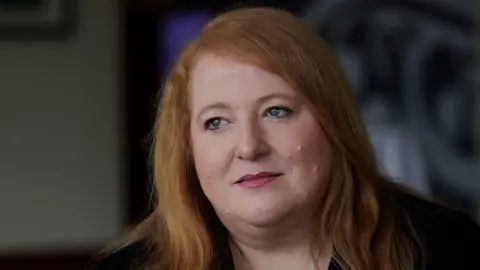 PA Media
PA MediaThe Justice Minister said the review “represents a significant commitment to transparency and accountability”.
Naomi Long said the NI Policing Board should be “afforded the time” to consider the review and added she stands “ready to support the Board in whatever action it feels is appropriate when it comes to implementing any recommendations” from the report.
It is expected that there will be a special meeting of the policing board to look at the report.
Breaking News
Crews attend ‘serious explosion’ at warehouse
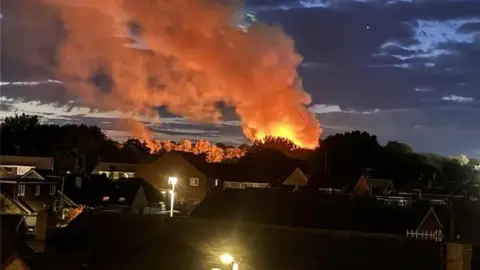
Read more on post.
An industrial estate is being evacuated following a “serious” explosion.
Police, ambulance crews and firefighters were called to the Groundwell Industrial Estate on Crompton Road in Swindon at about 19:30 BST following an explosion in a warehouse.
Wiltshire Police described the incident as “serious” and said a large cordon is in place around the scene.
A force spokesperson said they are working to evacuate the immediate area, and that people living nearby should stay indoors and keep their windows closed for their own safety.
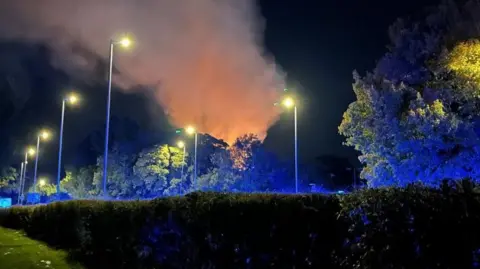
Dorset and Wiltshire Fire and Rescue Service said it was dealing with a large warehouse fire and currently has 10 fire engines at the scene, along with other specialist vehicles.
Dozens of residents have written on social media that they felt their homes shake following the explosion.
Breaking News
Justice minister ‘surprised’ Irish Prison Service paid ‘2 Johnnies’ €24,600 for podcast

Read more on post .
Minister for Justice Jim O’Callaghan has said he was “surprised” that the Irish Prison Service paid almost €25,000 to The 2 Johnnies comedy duo for a podcast as part of a drive to recruit more prison officers.
The Minister said it was “a lot of money to spend on a podcast for recruitment” when he was asked about the payment after it emerged on Wednesday.
The IPS confirmed that a fee of €20,000, plus €4,600 in VAT, was agreed with the Tipperary entertainers for the show.
The sponsored hour-long podcast featured prison staff speaking about life working in an Irish jail and the advantages of a job in the penal system.
“I’m surprised that amount of money was spent. It doesn’t strike me as a necessary expenditure when you consider all the obligations that rest on the prison service,” said Mr O’Callaghan.
It has also emerged that the comedy act received no payment from An Garda Síochána for a similar podcast with two garda recruits.
Garda Commissioner Justin Kelly said the Garda “did the same podcast” last year, when Garda members were interviewed by The 2 Johnnies “and we didn’t pay anything for it”.
He added it was “really useful for us … it was a really good audience for us” at a time when the Garda was running its own recruitment campaign.
The Minister was asked about the payment while attending the annual conference of the Association of Garda Superintendents (AGS) in Trim, Co Meath.
He said he went to the National Ploughing Championships last week to launch the new Garda recruitment competition at no expense and that the commissioner does this promotion work for recruitment too.
Mr O’Callaghan said public money had “to be spent efficiently and carefully”.
Asked about recent public order incidents in Dublin, Mr O’Callaghan and Mr Kelly said a new plan to increase the number of gardaí on the streets would yield clear results before Christmas.
They both rejected the allegation Dublin is unsafe or is run by street gangs in places.
Reacting to the two serious stabbings that took place in Dublin over the weekend, including a gang attack that left a 17-year-old with up to 20 wounds, Mr O’Callaghan said Dublin was “a large international capital city”.
“We are going to get some criminal activity in a city of that size. I am also aware attacks get a lot of national coverage,” Mr O’Callaghan said.
Mr O’Callaghan said the victims of assaults and other crimes, including the man and teenager attacked in Dublin at the weekend, would say they were not safe in Dublin, but overall, he believed the city was safe.
He said the latest data from the Garda and the HSE showed that knife crime and injuries from knife assaults were down and insisted that gardaí “have access to and control all parts of Dublin city”.
Mr Kelly, who took over as Garda Commissioner from Drew Harris last month, said there was no part of Dublin that was a no-go area run or even dominated by criminals.
“Dublin is a large city with 1¾ million, approximately, people in it. In any large city, you’re going to have lots of incidents,” he said, though he accepted some people felt unsafe.
A high-visibility operation was in place in the areas policed by Store Street, Pearse Street and Kevin Street Garda stations in Dublin city, having been rolled out by Assistant Commissioner Paul Cleary. This included far more frontline uniform gardaí on the beat, which was now being extended to other parts of the city and would become very obvious in the period to Christmas.
AGS president Supt Colm Murphy said that the new “operating policing model”, which has amalgamated several Garda divisions into much larger “super divisions”, was now fully rolled out.
However, the promised increase in manpower required to staff the additional roles for superintendents had not been delivered. This has resulted in “weakened links” between Garda members of all ranks and the communities they policed.
The superintendents want numbers in their ranks increased from 168 at present to at least 190. Mr Kelly said he was examining the numbers and believed more superintendents posts were needed.
There are about 14,400 members of all ranks in the Garda and Mr Kelly said he hoped the force would reach 15,000 next year.
The process of joining the Garda had been expedited with a much shorter period between being offered a place in the force and starting training.
Breaking News
23 renewable energy projects due in next four years

This post was originally published on this site.
Minister for Climate, Energy and the Environment, Darragh O’Brien, has welcomed the results of the latest national auction for new onshore wind and solar energy projects as part of the Renewable Electricity Support Scheme.
The outcome will see 23 major new renewable energy projects delivered over the next four years, mainly in the east, southeast and midlands of the country.
Included in that are 18 solar farms and five onshore wind developments, which, between them, will produce enough clean electricity for 357,000 homes.
That will be over 200MW of electricity from wind and 860MW from solar – a significant contribution to Ireland’s target of 80% of electricity demand to be met by renewable sources.
The outcome also underscores that solar can compete with onshore wind farms and is now Ireland’s fastest growing renewable electricity source.
Wind Energy Ireland, which represents wind farm developers, said it was delighted to see five wind projects win contracts but expressed disappointment with the size.
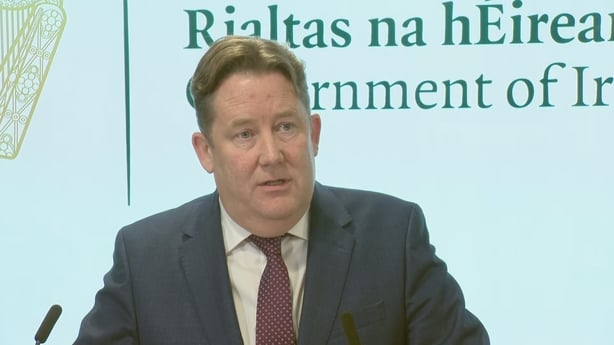
Its CEO, Noel Cunniffe said, today’s auction means more clean, affordable and secure power for Irish families and businesses.
“While we’re delighted to see five of our projects win contracts, we had hoped for a bigger auction and to see more projects get over the line.
“Our priority now is to focus on finding an alternative route to market for those unsuccessful projects while preparing for next year’s auction by working with the Government to get more wind farms out of the planning system and with secure grid connections.”
The Renewable Electricity Support Scheme operates competitive auctions where developers of wind and solar farms offering to produce and supply renewable electricity to the national electricity grid for a 15-year period at a Government supported price.
The average price achieved on this occasion is €98.81 per megawatt hour of electricity.
This is the amount successful renewable energy providers are guaranteed to be paid, even when the wholesale price of electricity falls below that level.
However, if wholesale prices are higher, the renewable electricity suppliers are required to repay money to electricity customers.
It is a two-way settlement arrangement that provides significant protection to consumers while at the same time ensuring the economic sustainability and attractiveness of the renewable energy projects for developers.
This was the fifth auction to date, and the weighted-average price settled on was similar to that achieved under the last three of these auctions.
To participate in the auction, every bidder had to have planning permissions and electricity grid connection permissions in place and be prepared for their project to be operational and providing electricity to the national grid by 31 December 2029.
On this occasion, there were 40 applicants, but only 33 qualified to make bids.
This included 10 proposed onshore wind farm projects and 23 proposed solar farms.
Out of them, five wind farms and five solar farms made unsuccessful bids.
This left 23 successful bidders, 18 of which were solar farms.
All projects will be obligated to contribute to a Community Benefit Fund.
The minimum contribution will be €2 per megawatt hour of electricity.
This should yield a total of €45 million in community benefits over the next 15 years. That will be €3 million per year of benefits for the communities in which the new renewable energy projects are located.
Minister O’Brien said the renewable energy that will flow from today’s auction will cut carbon emissions, reduce Ireland’s dependence on imported fuels, and generate investment and jobs in communities across the country.
“Accelerating and increasing the deployment of renewable electricity generation, especially onshore wind and solar, is fundamental to meeting our sectoral climate targets.
“July this year also marked a significant milestone for Ireland, as it was the first full month in which coal did not feature in our electricity fuel mix, after its use was discontinued at Moneypoint in June after 40 years.
“The deployment and connection of wind and solar energy generation at pace and at scale to our electricity grid benefits households and business by shielding them from volatile fossil fuel imports using our indigenous natural energy resources”, he said.
-
Culture1 day ago
Taylor Swift’s new cinema outing generates more than €12million in just 24 hours
-
Politics1 day ago
European Parliament snubs Orbán with vote to shield Italian MEP from Hungarian arrest
-
Culture1 day ago
Milan Fashion Week 2025: Unmissable shows and Giorgio Armani in mind
-
Business11 hours ago
Households to be offered energy bill changes, but unlikely to lead to savings
-
Culture2 days ago
Marvel stars Mark Ruffalo and Pedro Pascal stand up for Jimmy Kimmel as Disney boycott intensifies
-
Culture2 weeks ago
Life, loss, fame & family – the IFI Documentary Festival in focus
-
Travel & Lifestyle1 day ago
New York City’s Most Iconic Foods—and Where to Get Them
-
Other News1 day ago
Germany updates: Finance minister defends 2026 budget plans



